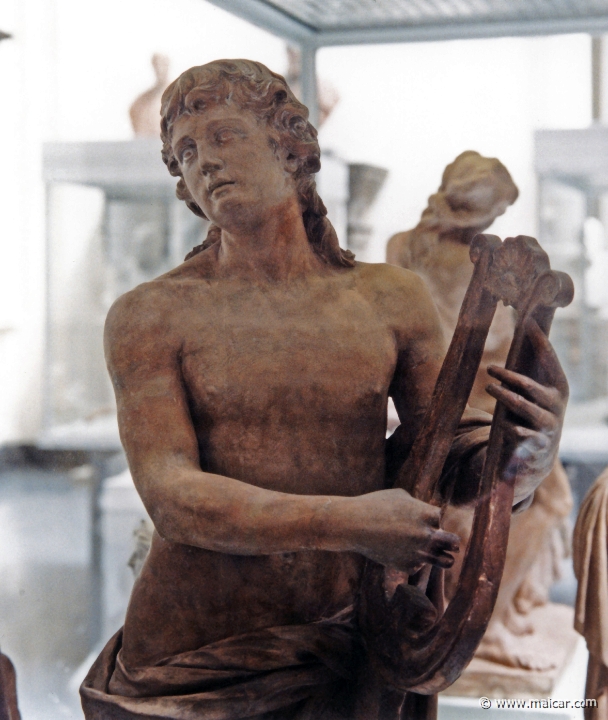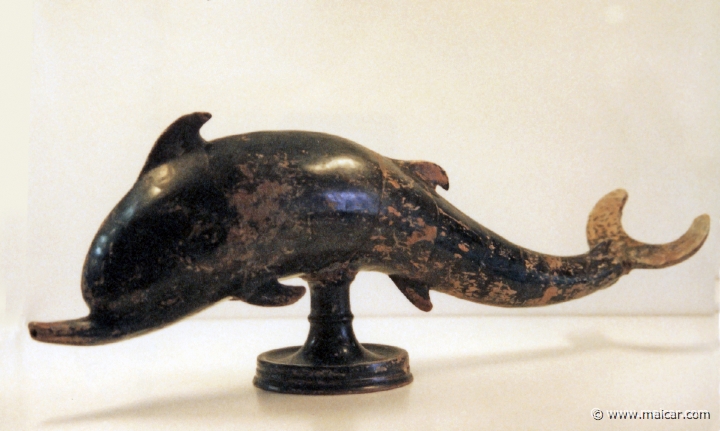|

|
The gifted musician Arion 2. 7820: Thomas Scheemakers 1740-1808: Arion and the dolphin. Terra-cotta. Victoria and Albert Museum.
|
|
Arion 2, who lived in Corinth when this city
was ruled by King
Periander
(625-585 BC), was the best citharist or lyre-player
of his time, coming originally from Methymna, a
city in the island of Lesbos. On his return from an
artistic tour in Italy, he was robbed by the crew
of his ship and forced to cast himself into the
sea. Against all odds, however, he landed in
Taenarum, which is the middle one of the three
southern Peloponnesian extremities, riding on the
back of a dolphin.
Talented artist
The lyre-player Arion 2 is said to have been the first to compose and name the dithyramb (originally a choral song to Dionysus 2), which he afterwards taught at Corinth. Arion 2 spent most of his time with King Periander, called by some Pyranthus, who held him in friendship and affection for the sake of his talent. But once he wished to leave Corinth for some time, and sail to Italy and Sicily, where he expected to earn huge sums of money with his art.
Success abroad
So he did, for both in Italy and Sicily he charmed everybody with his songs, being enriched as well as admired and beloved. And when he deemed that the time had come for him to return home, Arion 2, only trusting the Corinthians, hired in Italy a Corinthian vessel to carry him back from Tarentum, which is not far from the "heel" of Italy.
Greedy crew
There Arion 2 went on board, laden with money and wealth of all kinds. However, when the ship was out at sea, the crew plotted to take his money, and cast him overboard. In face of this distressing situation, Arion 2 asked for his life and offered them his money, but the crew would not listen to him, and instead told him either to kill himself, and so receive burial on land, or else to jump into the sea at once. So Arion 2 asked the crew to let him stand on the deck in all his regalia and sing for the last time. For music being, as they say, the companion of joy and the cure of sadness, nothing could be better for this musician than to sing a song and be reconciled with his fate. The sailors then, pleased at the thought of hearing the best singer in the world (for Arion 2 was, as a lyre-player, second to none in that age), granted his request. And when Arion 2, crowned in his usual way, robed and adorned, stood upon the extreme stern and sang the "Stirring Song", which is said to demand such a high key that few voices can reach up, dolphins came about the ship.
Dolphin saves him
When the song was over, Arion 2 threw himself into the sea with his lyre and all his equipment, and while the ship sailed back to Corinth, holding on the same course, he was taken on the back of a dolphin which bore him to Taenarum in Laconia. Some have said that these sailors were Arion 2's own slaves, who being of the opinion that there would be more profit in treacherous freedom than in honest servitude, cast their master into the sea, purposing to divide his fortune and goods among them.
He meets the treacherous sailors again
From Taenarum the musician returned to Corinth, but King Periander, not knowing what he was to believe, or rather suspecting Arion 2 to be an impostor, kept him in confinement while waiting for the sailors. When they finally arrived, they were craftily questioned about Arion 2, and they replied that the artist was safe and that they had left him very prosperous at Tarentum, enjoying both the devotion and the pleasures of the cities of the region. It was then, some say, that Arion 2 appeared before them, and the treacherous sailors could no longer deny what was being proved against them. Others say that Arion 2 reached land not at Taenarum but at Corinth, and that as he failed to push the dolphin back into the sea, it perished there. The king ordered it to be buried, and to raise a monument in its honour, and when the ship was brought back to Corinth by a storm, the sailors, being asked about Arion 2, replied that he had died and that they had buried him. When the king had heard them, he said:
"Tomorrow you will swear to that at the Dolphin's Monument." (Periander to the sailors. Hyginus, Fabulae 194).
In the meantime, Periander ordered the crew to be kept under guard and instructed Arion 2 to hide in the monument wearing the same clothes he had when he threw himself into the sea. So when the sailors came to swear by the dolphin's spirit that Arion 2 was dead, the artist, to their surprise and despair, came out of the monument. The sailors, who are sometimes said to have been seized by their master at Taenarum, were then crucified, and Arion 2 and the dolphin were placed by Apollo among the stars (see Delphinus at CONSTELLATIONS). This god, they say, appeared to Arion 2 in a dream at the time of the incident with his servants and sailors, and told him to sing in his poet's garb and crown, surrendering himself to those who would come to aid him.
Philosophers surpassed by Dolphins
Those were the dolphins, and for some the story of Arion 2 shows once more that to this clever animal alone nature has granted what many philosophers seek, namely friendship for no advantage. For the dolphin has no need at all of men, and yet it is their genial friend.
Witnesses on the shore
Those who witnessed the return of Arion 2 have said that it occurred one night when the moon shone bright upon the sea, and there was perfect calm and stillness, except for the dance and merry-making down by the shore with which the same witnesses were entertaining themselves. Suddenly, they say, a ripple was seen coming towards land close by a promontory, with its rapid movement being attended by foam and noise. All those who were feasting on the beach ran down to the place where it was coming to shore, and when they came close they saw dolphins, some forming an encircling line, others leading the way to the smoothest part of the shore, and others playing the part of a rear-guard. And in their midst, uplifted above the sea, they saw a man, whom they could not recognize until the dolphins deposited him on land. Then they could see that it was Arion 2, for he pronounced his name, and was wearing the well-known ceremonial robes that he normally wore when he played and sang.
The story by Arion 2 himself
|

|
The Dolphin, better gifted than many philosophers. 0312: Dolphin from Eretria, Euboea, 330-310 BC. Staatliches Antikensammlungen, München.
|
|
When they had conducted him into a tent, Arion 2 told them the story straightaway; for he was not sick, but just wearied by the rush of his ride. He said that he had decided to leave Italy some time ago, and that a recent letter from Periander had stimulated his desire the more. When a Corinthian merchant-vessel appeared, he said, he went on board, and they sailed, favored by a moderate breeze, for three days. But then Arion 2 got the feeling that the sailors were plotting against him, which was secretly confirmed by the pilot, who warned him that they were resolved to kill him that same night. Now Arion 2, not wishing to die in a meaningless way, decided to take for his shroud the sophisticated attire he used to wear at competitions, and with it on sing a final song to life, as swans generously do. So, having adorned himself and taken his stand beside the bulwark at the stern, he announced his desire to sing an ode to Pythian Apollo. As he sang, the sun was sinking into the sea, and the Peloponnesus was already in sight, but then Arion 2, seeing that the sailors advanced with bared knives, threw himself as far away from the ship as possible. It was then that dolphins swam beneath him and, bearing him upward, prevented him to be submerged. Arion 2 said that many dolphins gathered around him, relieving one another and bearing him in alternation.
Brought safe to land
Many thoughts came to Arion 2's mind, according to his own account, while he was being carried by the dolphins through a sea without a wave and under a sky dotted with stars. He remembered the gods, the many eyes of Justice, and a few other things that are usually remembered on such circumstances. And when the shore appeared in their path, the dolphins skirted close to land, and deposited him on the beach with the same care as a boat is brought into harbor. When the witnesses had listened to Arion 2's account and they had ascertained the name of the captain and the pilot and the ship's emblems, they sent out boats and soldiers to watch all landing-places, and these later seized the ship and arrested the sailors.
Another with identical name
Arion 1 is a famous horse (see BESTIARY).